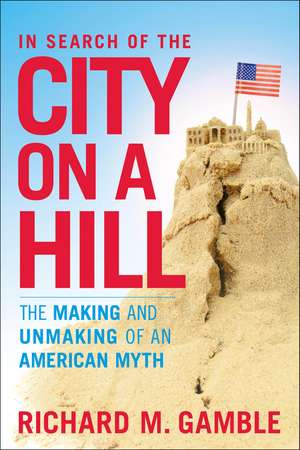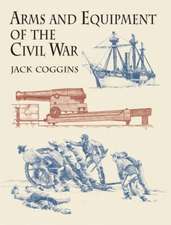In Search of the City on a Hill: The Making and Unmaking of an American Myth
Autor Dr Richard M. Gambleen Limba Engleză Hardback – 30 mai 2012
In Search of the City on a Hill challenges the widespread assumption that Americans have always used this potent metaphor to define their national identity. It demonstrates that America's 'redeemer myth' owes more to nineteenth- and twentieth-century reinventions of the Puritans than to the colonists' own conceptions of divine election.
It reconstructs the complete story of 'the city on a hill' from its Puritan origins to the present day for the first time. From John Winthrop's 1630 'Model of Christian Charity' and the history books of the nineteenth century to the metaphor's sudden prominence in the 1960s and Reagan's skillful incorporation of it into his rhetoric in the 80s, 'the city on a hill' has had a complex history: this history reveals much about received notions of American exceptionalism, America's identity as a Christian nation, and the impact of America's civil religion.
The conclusion considers the current status of 'the city on a hill' and summarizes what this story of national myth eclipsing biblical metaphor teaches us about the evolution of America's identity.
It reconstructs the complete story of 'the city on a hill' from its Puritan origins to the present day for the first time. From John Winthrop's 1630 'Model of Christian Charity' and the history books of the nineteenth century to the metaphor's sudden prominence in the 1960s and Reagan's skillful incorporation of it into his rhetoric in the 80s, 'the city on a hill' has had a complex history: this history reveals much about received notions of American exceptionalism, America's identity as a Christian nation, and the impact of America's civil religion.
The conclusion considers the current status of 'the city on a hill' and summarizes what this story of national myth eclipsing biblical metaphor teaches us about the evolution of America's identity.
Preț: 204.39 lei
Preț vechi: 312.22 lei
-35% Nou
Puncte Express: 307
Preț estimativ în valută:
39.12€ • 42.51$ • 32.88£
39.12€ • 42.51$ • 32.88£
Carte tipărită la comandă
Livrare economică 19 aprilie-03 mai
Preluare comenzi: 021 569.72.76
Specificații
ISBN-13: 9781441162328
ISBN-10: 1441162321
Pagini: 224
Dimensiuni: 156 x 234 x 20 mm
Greutate: 0.52 kg
Ediția:New.
Editura: Bloomsbury Publishing
Colecția Continuum
Locul publicării:London, United Kingdom
ISBN-10: 1441162321
Pagini: 224
Dimensiuni: 156 x 234 x 20 mm
Greutate: 0.52 kg
Ediția:New.
Editura: Bloomsbury Publishing
Colecția Continuum
Locul publicării:London, United Kingdom
Caracteristici
This book is a well-argued, well-written and concise critique of the American civil religion.
Notă biografică
Richard M. Gamble holds the Anna Margaret Ross Alexander Chair in History and Political Science at Hillsdale College, Michigan, USA.
Cuprins
Introduction \ 1. A Foreign Country \ 2. The Good Land \ 3. A Land of Light, 1630-1838 \ 4. A Spectacle to the World, 1838-1930 \ 5. The Revolutionary City, 1930-1969 \ 6. The Shining City, 1969-1989 \ 7. The Once and Future City \ A Note on Sources \ Index
Recenzii
A thought provoking analysis of how the biblical metaphor of "a city on a hill" became a national myth. Gamble begins with a careful analysis of John Winthrop's 1630 lay sermon in the context of its time and traces the ways in which the biblical image was employed by others to define American identity in the two hundred years that intervened between the time when Winthrop delivered his sermon and its recovery in the nineteenth century. The concluding chapters explore how politicians including John F. Kennedy, Ronald Reagan, Michael Dukakis, and Sarah Palin have appropriated Winthrop's name and words to define American exceptionalism, and what this means for America as a nation and for Christians living within the nation.
In Search of the City on a Hill is the most important study of the origins and of the evolution of a national myth. For the second time Richard Gamble took it upon himself to reveal and prove the insidious and particularly American historical tendency to employ religion for political purposes - indeed, to subordinate matters of faith to populist publicity, to enhance the latter by the former. This is a lone cry in the midst of a deafening wilderness, but one enriched with a most serious scholarly amassing of historical evidence.
'Civil religion is voracious and will gobble up anything it thinks useful'. That stark observation of Rowland Sherrill has never been more conclusively proven than by Richard M. Gamble's In Search of the City on a Hill. His discovery of the recent and artificial provenance of a holy verse in the American Creed proves even more astounding for the evidence that doesn't exist than for the evidence it unearths. This concise masterpiece of historical detection blew my mind. It will also blow the circuits of misguided conservatives, neoconservatives, and evangelicals who have been duped (or duped others) into an idolatrous interpretation of their nation, their history, themselves.
Gamble's book is an impressive piece of contextual scholarship that presents religious and political issues in a concise and entertaining way and raises crucial if inconvenient questions concerning the interpretation of historical documents and the evolution of influential ideas. His tenacious research provides answers many would not like to hear. He calls attention to those at the top who, almost always, consciously distort the past for an imagined future. Gamble dares to question a national myth, but by such an act he serves rather than desecrates the American experience. Such an honest, well written work should become a textbook for both students and established scholars of American thought.
In Search of the City on a Hill is the most important study of the origins and of the evolution of a national myth. For the second time Richard Gamble took it upon himself to reveal and prove the insidious and particularly American historical tendency to employ religion for political purposes - indeed, to subordinate matters of faith to populist publicity, to enhance the latter by the former. This is a lone cry in the midst of a deafening wilderness, but one enriched with a most serious scholarly amassing of historical evidence.
'Civil religion is voracious and will gobble up anything it thinks useful'. That stark observation of Rowland Sherrill has never been more conclusively proven than by Richard M. Gamble's In Search of the City on a Hill. His discovery of the recent and artificial provenance of a holy verse in the American Creed proves even more astounding for the evidence that doesn't exist than for the evidence it unearths. This concise masterpiece of historical detection blew my mind. It will also blow the circuits of misguided conservatives, neoconservatives, and evangelicals who have been duped (or duped others) into an idolatrous interpretation of their nation, their history, themselves.
Gamble's book is an impressive piece of contextual scholarship that presents religious and political issues in a concise and entertaining way and raises crucial if inconvenient questions concerning the interpretation of historical documents and the evolution of influential ideas. His tenacious research provides answers many would not like to hear. He calls attention to those at the top who, almost always, consciously distort the past for an imagined future. Gamble dares to question a national myth, but by such an act he serves rather than desecrates the American experience. Such an honest, well written work should become a textbook for both students and established scholars of American thought.









